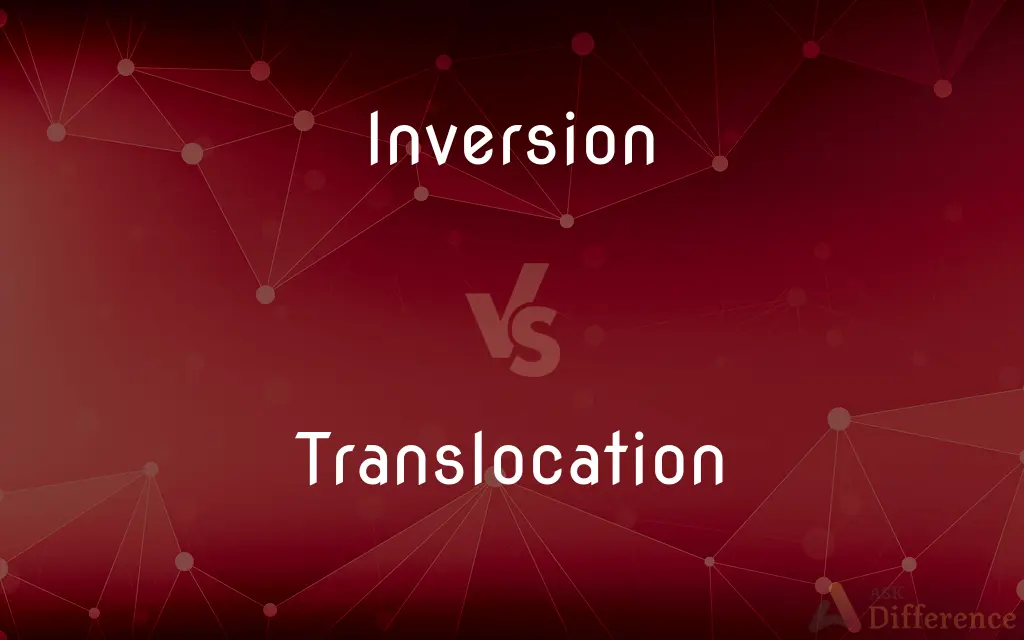Inversion vs. Translocation — What's the Difference?
Edited by Tayyaba Rehman — By Fiza Rafique — Updated on September 27, 2023
"Inversion" is the reversal of a chromosome segment's orientation, while "Translocation" involves the movement of a chromosome segment to a different position, often on another chromosome.

Difference Between Inversion and Translocation
Table of Contents
ADVERTISEMENT
Key Differences
Both Inversion and Translocation are types of chromosomal abnormalities, but they manifest in different ways. Inversion pertains to the process where a segment of a chromosome gets reversed end to end. On the other hand, Translocation describes when a segment of one chromosome detaches and reattaches to a different chromosome.
In genetics, an Inversion might not always cause problems unless it disrupts vital genes or occurs during meiosis, leading to imbalances. Meanwhile, Translocation can result in various disorders, especially if it results in an extra copy or a missing part of vital genes.
Detecting an Inversion typically requires specific techniques since the chromosome's overall length doesn't change. Translocation, on the other hand, can sometimes be easier to identify, particularly when parts of visibly different chromosomes swap positions.
It's important to note that while Inversion exclusively revolves around a single chromosome's internal rearrangement, Translocation often impacts two chromosomes, where segments interchange between them.
Comparison Chart
Definition
Reversal of a chromosome segment's orientation
Movement of a chromosome segment to another position or another chromosome
ADVERTISEMENT
Impact on Chromosomes
Single chromosome's internal rearrangement
Typically involves two chromosomes swapping segments
Resulting Conditions
May cause genetic disorders if it disrupts gene sequences during meiosis
Can lead to genetic disorders like Down syndrome if segments are vital
Detection
Often requires specific techniques as chromosome length remains the same
Sometimes more evident when visibly different chromosomes swap segments
Genetic Consequence
May not always lead to a phenotype change unless vital genes are disrupted
Can lead to significant phenotypic changes due to gene disruptions
Compare with Definitions
Inversion
A deviation from the usual gene sequence order.
The study identified several inversions that were previously unknown.
Translocation
A rearrangement that can lead to gene fusion.
The specific translocation led to a fusion of two genes, resulting in a novel protein.
Inversion
A chromosomal rearrangement affecting a single chromosome.
Inversions can sometimes lead to reduced fertility in affected individuals.
Translocation
The movement of a chromosome segment to a different location.
A balanced translocation was found in the patient's genome.
Inversion
A genetic mutation that doesn't involve loss of genetic material.
The patient had an inversion, but no genetic material was missing.
Translocation
A genetic event leading to a change in chromosome structure.
Translocations can sometimes be the cause of recurrent miscarriages in couples.
Inversion
An alteration in gene order within a chromosome.
The discovered inversion could be the cause of the observed phenotype.
Translocation
An exchange of chromosome parts, often between non-homologous chromosomes.
Certain types of leukemia are associated with specific translocations.
Inversion
The action of inverting something or the state of being inverted
The inversion of the normal domestic arrangement
An inversion of traditional customer–supplier relationships
Translocation
A chromosomal anomaly often detected using cytogenetic techniques.
The laboratory confirmed the suspected translocation using advanced cytogenetic methods.
Inversion
A reversal of the normal decrease of air temperature with altitude, or of water temperature with depth.
Translocation
A change of location.
Inversion
The process of finding a quantity, function, etc. from a given one such that the product of the two under a particular operation is the identity.
Translocation
A transfer of a chromosomal segment to a new position, especially on a nonhomologous chromosome.
Inversion
The action or practice of relocating a multinational company's legal residence to a jurisdiction where taxes are levied at a lower rate
Since the company maintains a franchisee model, it is a viable target for inversion
Administration officials admit that their new effort to deter corporate inversions won't actually stop the practice
Translocation
A chromosomal segment that is translocated.
Inversion
Homosexuality.
Translocation
(Botany) The movement of sap downward and upward within the phloem, bringing nutrients to all living parts of a plant.
Inversion
The act of inverting.
Translocation
Removal of things from one place to another; displacement; substitution of one thing for another.
Inversion
The state of being inverted.
Translocation
(genetics) A transfer of a chromosomal segment to a new position, especially on a nonhomologous chromosome; the segment so transferred.
Inversion
An interchange of position of adjacent objects in a sequence, especially a change in normal word order, such as the placement of a verb before its subject.
Translocation
(biochemistry) A transfer of a molecule through a membrane.
Inversion
A rearrangement of tones in which the upper and lower voices of a melody are transposed, as in counterpoint.
Translocation
Removal of things from one place to another; substitution of one thing for another.
There happened certain translocations at the deluge.
Inversion
A rearrangement of tones in which each interval in a single melody is applied in the opposite direction.
Translocation
The transport of dissolved material within a plant
Inversion
An arrangement of the tones of a chord such that the root is not the lowest pitch, as in the rearrangement of the C-major triad CEG to EGC.
Translocation
(genetics) an exchange of chromosome parts;
Translocations can result in serious congenital disorders
Inversion
(Psychology) In early psychology, behavior or attitudes in an individual considered typical of the opposite sex, including sexual attraction to members of one's own sex. No longer in scientific use.
Inversion
(Chemistry) Conversion of a substance in which the direction of optical rotation is reversed, from the dextrorotatory to the levorotatory or from the levorotatory to the dextrorotatory form.
Inversion
(Meteorology) An atmospheric condition in which the air temperature rises with increasing altitude, holding surface air down and preventing dispersion of pollutants.
Inversion
(Genetics) A chromosomal rearrangement in which a segment of the chromosome breaks off and reattaches in the reverse direction.
Inversion
The action of inverting.
Inversion
The act of being in an inverted state; being upside down, inside out, or in a reverse sequence.
Inversion
(music) The reversal of an interval; the move of one pitch in an interval up or down an octave.
Inversion
(music) The position of a chord which has a note other than the root as its bass note.
Inversion
(music) The flipping of a melody or contrapuntal line so that high notes become low and vice versa; the reversal of a pitch contour.
Inversion
(genetics) A segment of DNA in the context of a chromosome that is reversed in orientation relative to a reference karyotype or genome.
Inversion
(meteorology) A situation where air temperature increases with altitude (the ground being colder than the surrounding air).
Temperature inversion
Inversion
A section of a roller coaster where passengers are temporarily turned upside down.
Inversion
(grammar) deviation from standard word order by putting the predicate before the subject. It takes place in questions with auxiliary verbs and in normal, affirmative clauses beginning with a negative particle, for the purpose of emphasis.
Inversion
(algebra) An operation on a group, analogous to negation.
Inversion
, particularly in early psychoanalysis.
Inversion
The act of inverting, or turning over or backward, or the state of being inverted.
Inversion
A change by inverted order; a reversed position or arrangement of things; transposition.
It is just the inversion of an act of Parliament; your lordship first signed it, and then it was passed among the Lords and Commons.
Inversion
A movement in tactics by which the order of companies in line is inverted, the right being on the left, the left on the right, and so on.
Inversion
A change in the order of the terms of a proportion, so that the second takes the place of the first, and the fourth of the third.
Inversion
A peculiar method of transformation, in which a figure is replaced by its inverse figure. Propositions that are true for the original figure thus furnish new propositions that are true in the inverse figure. See Inverse figures, under Inverse.
Inversion
A change of the usual order of words or phrases; as, "of all vices, impurity is one of the most detestable," instead of, "impurity is one of the most detestable of all vices."
Inversion
A method of reasoning in which the orator shows that arguments advanced by his adversary in opposition to him are really favorable to his cause.
Inversion
Said of intervals, when the lower tone is placed an octave higher, so that fifths become fourths, thirds sixths, etc.
Inversion
The folding back of strata upon themselves, as by upheaval, in such a manner that the order of succession appears to be reversed.
Inversion
The act or process by which cane sugar (sucrose), under the action of heat and acids or enzymes (as diastase), is broken or split up into grape sugar (dextrose), and fruit sugar (levulose); also, less properly, the process by which starch is converted into grape sugar (dextrose).
Inversion
A reversal of the usual temperature gradient of the atmosphere, in which the temperature increases with increased altitude, rather than falling. Called also temperature inversion.
Inversion
The conversion of direct current into alternating current; the inverse of rectification. See inverted rectifier.
Inversion
A portion of the genome in which the DNA has been turned around, and runs in a direction opposite to its normal direction, and consequently the genes are present in the reverse of their usual order.
Inversion
The layer of air near the earth is cooler than an overlying layer
Inversion
Abnormal condition in which an organ is turned inward or inside out (as when the upper part of the uterus is pulled into the cervical canal after childbirth)
Inversion
A chemical process in which the direction of optical rotation of a substance is reversed from dextrorotatory to levorotary or vice versa
Inversion
(genetics) a kind of mutation in which the order of the genes in a section of a chromosome is reversed
Inversion
The reversal of the normal order of words
Inversion
(counterpoint) a variation of a melody or part in which ll ascending intervals are replaced by descending intervals and vice versa
Inversion
A term formerly used to mean taking on the gender role of the opposite sex
Inversion
Turning upside down; setting on end
Inversion
The act of turning inside out
Inversion
A reversal of orientation in a chromosome segment.
Genetic testing revealed an inversion in one of the chromosomes.
Common Curiosities
What is a balanced Translocation?
It's when chromosome segments swap places without any genetic material loss.
Are Inversion and Translocation both chromosomal mutations?
Yes, they are types of chromosomal structural rearrangements.
Can Inversion affect fertility?
Yes, in some cases, inversions can reduce an individual's fertility.
How are Inversion and Translocation detected?
Through cytogenetic techniques like karyotyping and molecular methods.
Do Inversion and Translocation both involve loss of genetic material?
Inversion doesn't result in a loss, while Translocation can be balanced (no loss) or unbalanced (with loss).
Does Inversion always lead to genetic disorders?
Not always, but it can if vital genes are disrupted or during meiosis.
Is a Translocation always harmful?
Not always, but it can lead to disorders if vital genes are impacted.
Can Inversion and Translocation be inherited?
Yes, they can be passed from parents to offspring.
Is Translocation exclusive to chromosomes?
In genetics, yes, but in biology, "translocation" can also refer to movement of substances in plants.
Can these mutations contribute to evolution?
Yes, they can introduce genetic diversity, potentially driving evolution.
Share Your Discovery

Previous Comparison
Illuminate vs. Shine
Next Comparison
Argument vs. SubjectAuthor Spotlight
Written by
Fiza RafiqueFiza Rafique is a skilled content writer at AskDifference.com, where she meticulously refines and enhances written pieces. Drawing from her vast editorial expertise, Fiza ensures clarity, accuracy, and precision in every article. Passionate about language, she continually seeks to elevate the quality of content for readers worldwide.
Edited by
Tayyaba RehmanTayyaba Rehman is a distinguished writer, currently serving as a primary contributor to askdifference.com. As a researcher in semantics and etymology, Tayyaba's passion for the complexity of languages and their distinctions has found a perfect home on the platform. Tayyaba delves into the intricacies of language, distinguishing between commonly confused words and phrases, thereby providing clarity for readers worldwide.














































